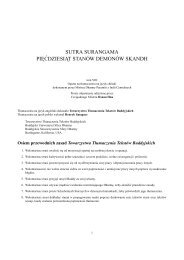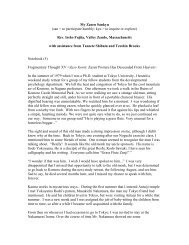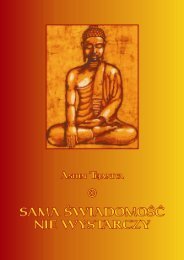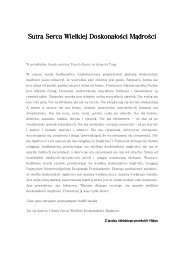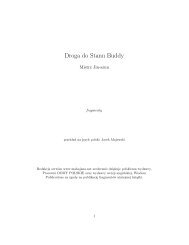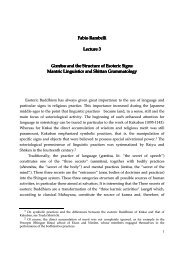Mahamudra Teaching - Dharma Media
Mahamudra Teaching - Dharma Media
Mahamudra Teaching - Dharma Media
Create successful ePaper yourself
Turn your PDF publications into a flip-book with our unique Google optimized e-Paper software.
out!” We ask, “Lama, can you come to my shrine room and bless it?” Bringing blessing means asking<br />
deities to come. We see things in that way on the outside. We have that duality.<br />
Then, inside we also think we have deities and demons of the mind. When we experience a bit of<br />
compassion, loving kindness, happiness, or peace, it is like a peaceful deity. We feel happy and<br />
peaceful. And then, when along comes the anger, hatred, attachment, it is like a devil or demon. It<br />
destroys our happiness and peace. So we have to recognize that. We have to see that.<br />
One-Taste and Non-Meditation<br />
In realization, we experience the nature of happiness as emptiness; we experience the nature of<br />
suffering or hatred as emptiness. They are equalized. This morning I mentioned the four yogas of<br />
<strong>Mahamudra</strong>, but we only covered the first two: the one-pointed nature and the free-from-elaboration<br />
or unelaborated nature. I had not yet given instruction on one-taste and non-meditation. So it is when<br />
you can meditate well, then both suffering and happiness are experienced as having the nature of<br />
emptiness. They have one taste. Meditate on that. Not rejecting the suffering, not attaching to the<br />
happiness. Whatever comes let it come. Just sustain the <strong>Mahamudra</strong>.<br />
When that progresses or becomes enhanced, then it becomes effortless. Then there is no need to make<br />
any effort. Then that is called “no more meditation.”<br />
So when you have this kind of practice it is similar to the following: whether snow falls, it dissolves<br />
in the ocean, whether hail falls, it dissolves into the ocean, whether rain falls, it just dissolves into the<br />
ocean. It is all of just one nature. Even if you perceive that “ah, this is snow”, “ah, this is hail”, “ah,<br />
this is rain”, yet they dissolve into the ocean. There is no separation. Or, in other words, in the<br />
<strong>Mahamudra</strong> practice when any thought arises just see that <strong>Mahamudra</strong> nature. They are all equal.<br />
When you have the fire of the <strong>Mahamudra</strong>, when you have any thoughts or if any complications of<br />
the thoughts should arise, put them in the fire of the <strong>Mahamudra</strong>. It burns all. You throw clothes into<br />
a fire and they burn. They become ashes. You throw trees or wood into a fire. They burn to ash. You<br />
throw all your garbage in a fire and it burns and becomes ash. Even if you throw silk into a fire, it<br />
burns. It becomes ash. When it becomes ash, there is no longer any difference. The silk is no longer<br />
special and the garbage is longer revolting. They both have become ashes. So just meditate like that.<br />
Therefore, when you meditate without grasping, without fixation, you free from the rope of fixation<br />
and grasping. There is no bondage.<br />
Otherwise, when we have things like hatred or resentment for somebody then we always have doubt.<br />
“Oh, this person is thinking something bad about me, this person is doing something bad to me.”<br />
Even if the person is not doing something like that, we have that kind of fear. That kind of doubt is<br />
always there. And there is no peace of mind. Whether that person is actual doing something or not,<br />
we always have that kind of thought. The suffering is there. So in <strong>Mahamudra</strong>, when you come to<br />
<strong>Mahamudra</strong> practice, look at that nature. For example, if someone hurts you, we perceive that person<br />
as an enemy. And when someone provokes you, then we regard this person as very provocative,<br />
right? So for <strong>Mahamudra</strong> practice, the provocative is welcome! Through them you see the weakness<br />
of your <strong>Mahamudra</strong> practice. You may say, “I know this, I understand this.” You just brag or boast<br />
around here and there. Then when someone provokes you, your face is so wrenched up! You get so<br />
upset. So right there is the chance to see. Remember your <strong>Mahamudra</strong> practice; see the illusory



![Shushogi, Dogen Zenji [PDF] - Mahajana.net](https://img.yumpu.com/50921105/1/190x219/shushogi-dogen-zenji-pdf-mahajananet.jpg?quality=85)

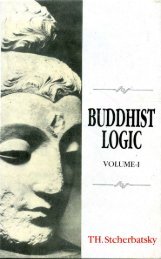
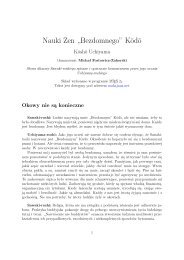
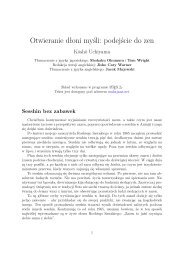
![wywiadu z Murakami Kosho Roshim [PDF] - Buddyzm w Polsce i na ...](https://img.yumpu.com/45809746/1/184x260/wywiadu-z-murakami-kosho-roshim-pdf-buddyzm-w-polsce-i-na-.jpg?quality=85)


